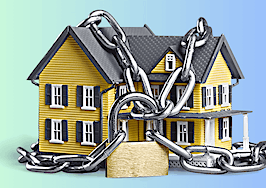No one can predict the future of real estate, but you can prepare. Find out what to prepare for and pick up the tools you’ll need at Virtual Inman Connect on Nov. 1-2, 2023. And don’t miss Inman Connect New York on Jan. 23-25, 2024, where AI, capital and more will be center stage. Bet big on the future and join us at Connect.
How is the uncertainty about whether mortgage interest rates increase even more impacting the real estate market? Are home prices coming back down any time soon, or will they remain steady or even increase? How does the inflation rate play into this mix? While soaring rates are baffling economists and frustrating industry Realtors, one expert with a proven track record tackles this conundrum and gives his take on what to expect all the way into 2025.
I recently sat down with Patrick Stone, the chairman and founder of title insurer Williston Financial Group and chairman of the Stone Group, a commercial brokerage and development company. For close to two decades, Patrick Stone has provided his economic insights on stage at Inman Connect. His predictions have almost always turned out to be correct.
Movement in America has been slowing down for at least 40 years
Stone explains how a heightened degree of uncertainty is underlying everything we’re experiencing right now. While people with low mortgages may feel they are unable to move due to affordability concerns, Stone explains that movement in America has been slowing down for decades:
I think that [homeowners unwilling to move due to the current low rate of their existing mortgage] has an impact. I think it’s overstated a little bit because candidly, movement in America has been slowing down progressively for the last 40 years.
If you go back to 1986, 20 percent of Americans moved annually, and about 12 percent of that was relocations within their own county. It’s now down to about 8.5 percent, so there’s been a steady decline in the amount of movement.
How uncertainty is impacting supply and demand
Stone defines supply as being, “The number of existing and new homes currently for sale.” Stone believes the number of new homes has been underbuilt for almost 15 years, with somewhere between 1.5 million and 3 million more new homes being needed.
Nevertheless, Stone attributes uncertainty as being a primary cause of what is happening today. The Great Recession caused people to be more cautious and lenders to be “extremely cautious.” While low interest rates tend to influence people about moving, job changes, family changes, aging, and retiring are all still in play and influence relocating.
While rates are higher, people tend to make fewer large decisions when they’re uncertain about the future. I mean, human nature is to be cautious when you’re uncertain. Consequently, you don’t go out and take a high-interest rate mortgage if you’re uncertain.
Understanding how demand works
Stone argues that demand is comprised of three factors: need, desire, and affordability. The need is “a function amount of people looking for a home.” As population groups, both the millennials and Gen Z are almost as large as the baby boomer generation, and they’re at the age where they are ready to become first-time buyers. According to Stone, this accounts for the “tremendous amount of need out there.”
In terms of desirability, about 75 percent of the millennials and 68 percent of Gen Z think that owning a home is the way to realize the American dream and to build intergenerational wealth, “so the desire is also very strong.”
Stone goes on to explain:
Affordability is a function of mortgage rates and earnings. [While] earnings have gone up, mortgage rates at 7.3 or more are discouraging and do impact affordability. Homebuyer housing payments are up 13.6% year over year. So, affordability has been a major factor. Existing home sales are down 16.3 percent year over year in July, so that is mostly because of affordability. [As a result of all three of these factors], supply is still way under where it should be.
Stone argues that the tremendous imbalance in supply is responsible for keeping real estate prices high.
People are amazed the prices haven’t gone down, but real estate is much more a function of supply and demand than the stock market. People look at the stock market, and especially the financial reporters, and they keep thinking real estate should go down. Seventy to 80 percent of all [stock market] investments are predicated on people’s perception of what’s going to happen in the future.
In other words, the stock market is influenced primarily by perception and speculation. It can experience wild swings in value almost instantaneously. In contrast, residential real estate is impacted more by supply and demand, and there’s usually way more time to react to any major shifts in value.
What the media really gets wrong about residential real estate
Stone explains how financial reporters and other media simply don’t understand the dynamics of what causes people to move.
One of the things that is not really understood by the media is how much the average price or median price varies by region. If you look at the US, the median price in July was roughly $412,000. In the Midwest, it ranged from $300,000 to 700,000. In the West, it was 629,000. So [there is] a phenomenal difference in median price by region.
Also, the press constantly does stories about people moving for political reasons, the sunshine or lower taxes. What they’re missing is why many young people are moving.
People talk about people relocating for political reasons or moving for the sunshine or the lower taxes. I think this is a myth. If you’re a young person living in the West right now, can you afford to buy a median-priced home at $629,000? Probably not.
If you can relocate somewhere in the Midwest where you can buy a home for $307,000 or in the South for $374,000 and you have the ability to have a job in those markets, you will [be more likely to] relocate.
Consequently, due to the extreme imbalance in supply and demand, Stone says he doesn’t expect to see any degradation in pricing.
Politicians don’t realize how detrimental their influence can be
While Congress kicked the can down the road about doing a government shutdown, Stone had this to say about the cost to the American people.
I don’t think the politicians realize what an impact they have on the average American when they do their silly political debates for no purpose, like not increasing the debt limit or shutting down the government. They think they’re making a point and appealing to people’s desires in the long term. What they’re [really] doing, they’re costing us all a lot of money.
If you drive mortgage rates up or keep mortgage rates high, that impacts a large segment of our population, everybody that’s involved in labor around building homes, Realtors, [mortgage professionals, etc.]. Having high interest rates impacts us all in one way or another.
While inflation has dropped dramatically from 8.26 percent in August of 2022 to 3.67 percent in August of 2023, Stone argues mortgage interest rates have not come down largely because of the debt limit debate and the threat of a government shutdown. Again, this is tied to uncertainty.
Also, bank regulators are talking about raising asset requirements, and lenders have tightened their lending standards a little bit, so “they’re on edge as well.”
Is there a recession ahead?
Due to the inverted yield curve and the other factors cited above, Stone believes that there is a recession on the horizon. The international market that buys our T-bills is also on edge.
You have this ongoing debate about whether or not we’ll have a recession because we have an inverted yield curve between the two-year and 10-year T bill. Every time that’s happened, we’ve had a recession. My gut is that we will have a small, inconsequential recession in early 2024. We need a recession, [and] candidly, we need it just to lower rates.
Although we’re starting to see labor costs come down, we need to get back to reality a little bit. A non-painful recession would probably help us reset our mental attitude about things. So, we’ll see if that occurs.
But [because] we have a lot of uncertainty out there. I mean, I could go on and on about geopolitical issues and everything else, the uncertainty out there is what’s keeping rates artificially high.
The good news about the loans in today’s markets
During the years leading up to the Great Recession, the average FICO score was 565. Stone blames Wall Street for much of what happened during that time.
I blame Wall Street because what they were taking mortgages and creating mortgage-backed securities. In order to increase the return, they were layering 15 percent to 20 percent of mortgage-backed securities with subprime loans at a higher rate to get the rate overall rate up on the securitization. When the market crashed, that made all those mortgage-backed securities irrelevant.
[Today] it’s been regulated to the point where we are probably overly cautious in our lending standards. Right now, there’s very little garbage out there around real estate. I think it’s about two-thirds of all mortgages in the last four years have had a FICO score of over 760.
What’s ahead going into 2024 and then into 2025?
Stone believes that more homes will be coming on the market due to more boomers moving and builders creating homes that are smaller but designed to still fit what consumers want today. Builders are also offering other incentives, such as mortgage rate buydowns.
The question is whether rates will come down, and if so, by how much? If rates come down, Stone says,
My personal opinion is it’ll start picking up in the second quarter of 2024, and the second half of 2024 will be pretty good. 2025 should be outstanding because the demand and desire are there. If we get the affordability in line, Katie bar the door.
If they get [interest rates] under six, I think that’ll be a fairly meaningful change. And if they continue to decline in the mid to low fives by the end of next year, 2025 will be a very good year. You’ll never see mortgage rates under 4 percent. Again, I don’t think that’ll ever happen.
In terms of the number of transactions, it looks as if we’ll have about 4.2 million transactions in 2023. In 2024, it should be back up in the normal range of five million.
For investors, Stone recommends looking at acquisitions, and for those looking to invest in single-family residences, he recommends looking for interest rate buy-downs and other programs that can help you lower your initial rate.
If rates come down and we don’t screw this up, if rates are under five percent, I see six million [transactions] again, so it’s time to be optimistic.
Let’s hope that Stone is right — he certainly has been in the past. If so, there’s sunshine on the horizon, even if rates may be headed much higher in the near future.
Historically, presidential election years are good for real estate. It remains to be seen if 2024 will follow suit, or due to all the uncertainly, not only in the industry, but even more so in the political environment, it may very well be a rockier ride than anyone can possibly imagine.
Bernice Ross, president and CEO of BrokerageUP and RealEstateC












